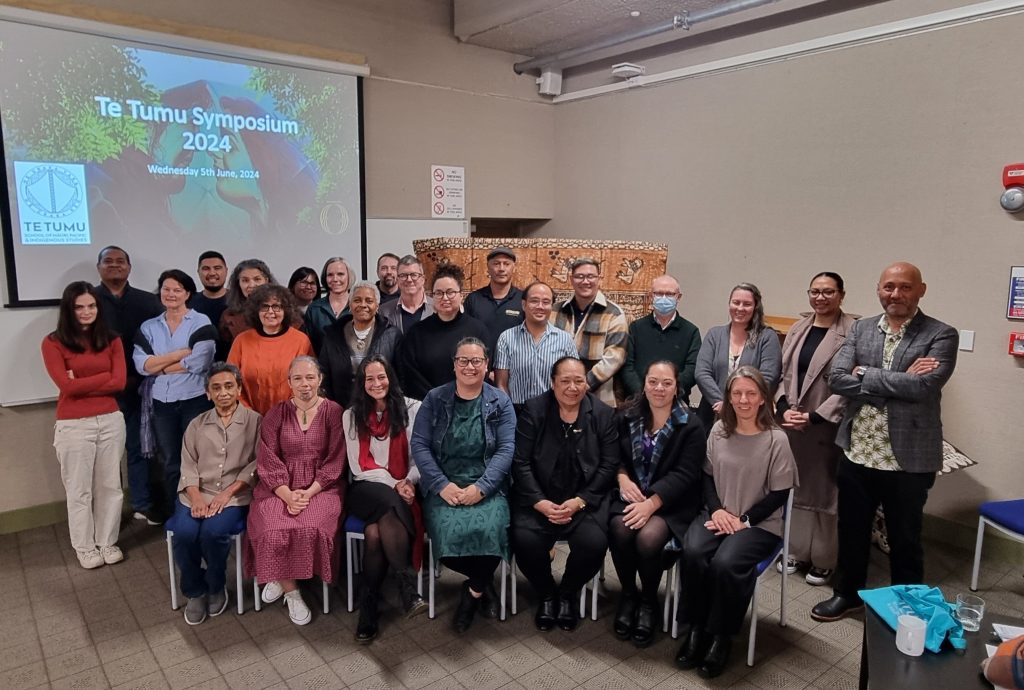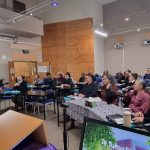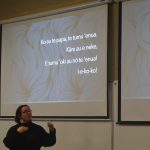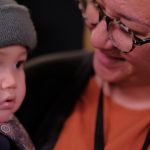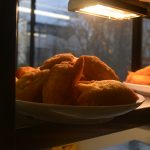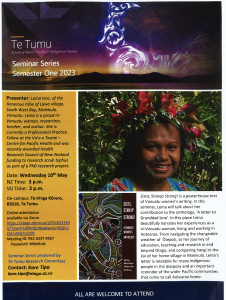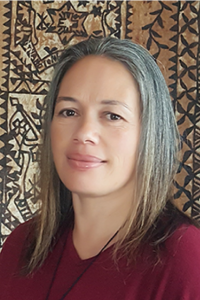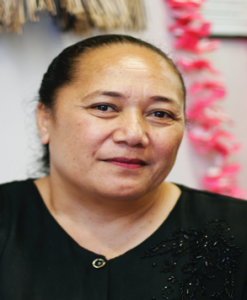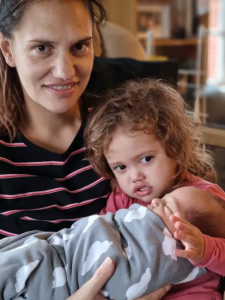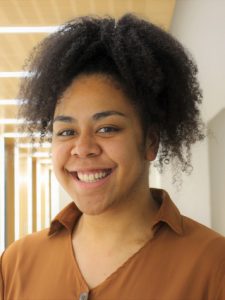Inaugural Te Tumu Symposium a showcase of diverse research excellence
On Wednesday 5 June, Te Tumu, School of Māori, Pacific and Indigenous Studies, hosted its inaugural research symposium to share and celebrate research from Te Tumu. The day began with a welcome from Te Tumu Dean Prof Patrick Vakaoti and a history of Te Tumu from Prof Michael Reilly. The programme included four sessions of Te Tumu staff and postgraduate students’ presentations, constructive question and answers segments, feedback, and encouragement.
Supported by Te Tumu’s Research Committee and Postgraduate Committee, the event welcomed attendance from those who are based in Ōtepoti, as well as distance students who are based in Te Whanganui ā Tara, and as far afield as New Caledonia. With special Tītī and fry bread kai, this gathering was truly an inspiring occasion and speaks to exciting research work that Te Tumu staff and students are doing locally, and regionally that are important contributions for their communities, and for the growth of Māori, Pacific and Indigenous Studies scholarship.
Session 1 was facilitated by Dr Paerau Warbrick, a lecturer in Māori Studies, and included presentations by Te Tumu staff member Paia Taani on intergenerational language transmission; and PhD students, Jenni Tupu who presented about transracial adoption, and Ella Cameron-Smith who presented on Ngaati Korokii Kahukura kai identities.
Session 2 was facilitated by Dr Telesia Kalavite, a lecturer in Pacific Studies, and included presentations by four PhD students: Frédéric Dichtel who presented on te reo grammatical structures; Regina Maniam who presented on engaging Indigenous values and methods in doctoral research; Stacey Kokaua-Balfour who presented on Cook Islands’ creative texts relating to the environment and climate change; and Jay Quintos who presented on critical perspectives on films about the Tboli people in the Philippines.
Session 3 was facilitated by Prof Michael Reilly, the Postgraduate Chair of Te Tumu. The session included staff member Prof Richard Jackson who presented on non-violent approaches to counterterrorism, and two PhD students: Jude Bautista who presented on visual social semiotics and critical lenses in discourse analyses; Kim Cope Tait who presented on personal sovereignty in the poetry of Hinemoana Baker.
Session 4 was facilitated by Dr Emma Powell, lecturer in Indigenous Studies and Programme Coordinator of the Master of Indigenous Studies (MIndS). The session included three MIndS distance students: Melissa Denzler, based in Te Whanganui ā Tara who presented on the cultural taxation of kaiako Māori; Elizabeth Hamilton, based in Whakatū, who presented on a approach for honouring Te Tiriti specifically relating to language learning policies for migrants and former refugees; and James Uri-Puati, based in the Cook Islands, who presented on a critical Indigenous framework for theorising second language learning.
Seminar: Leina Isno – Sista, Stanap Strong!
Leina Isno (ni-Vanuatu) will be presenting the next Te Tumu seminar at 3pm (NZ Time), Wednesday 10 May in Te Iringa Kōrero (3rd floor, Te Tumu). Leina will talk about her contribution to Sista, Stanap Strong!: A Vanuatu Women’s Anthology for which she wrote about her experiences as a ni-Vanuatu woman, living and working in Aotearoa.
Please click on the poster for more information.
This seminar will also be online via Zoom, Click here to join.
Meeting password 932 6337 4957
Password: Malekula.
Seminar contact: Kare Tipa, kare.tipa@otago.ac.nz
All are welcome to attend.
To Hell With Drowning: A Reflection
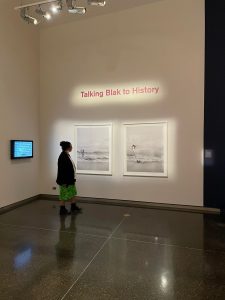
Māori scholar photographs Cook Islands scholar examining Aboriginal artwork confronting White Australian histories at the Australian National Museum, Canberra, April 2023. [click to enlarge]
This is the final reflection from our PhD students who attended the recent Australia Association for Pacific Studies conference in Canberra, by Stacey Kokaua-Balfour.
As someone who has only recently started their PhD, the recent AAPS conference was my first time attending an academic conference. I have come away with not only new questions but the awareness of new geographic and intellectual contexts that might shape those questions. What resonated most with me as someone who has operated in Pacific spaces in Aotearoa for some time, was the way our nation state and its distinct geo-political interests can shape not only how Pacific region and their peoples are framed but also what are considered the most important priorities for academic research.
AAPS was an opportunity to engage with Indigenous thinkers across cultures, nation state borders, languages, breaking across specific colonial interests in the Pacific. The Welcome to Country led by Aunty Serena Williams (Ngunnawal – Wiradjuri) best articulated the idea that as researchers, our best ideas spring from coming together and sharing the distinct and nuanced ways Indigenous peoples engage with land and each other.
Rethinking Australian Coloniality through Pacific Biography
Wanda Ieremia-Allan provides the second of the reflections from our PhD students who attended the recent AAPS conference in Canberra.
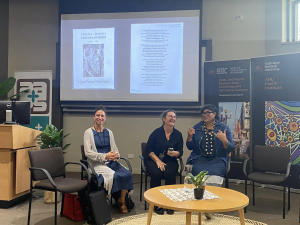
Wanda (right) alongside fellow panel presenters Hineitimoana Greensill and Pauline Reynolds [click to enlarge]
Fleets abound with Pacific scholars, creatives, activists and politicians met at the April 2023 ‘To Hell With Drowning’ Pacific Studies conference at the Australian National University (ANU) in Canberra. As a child of Sapapali’i, Sāoluafata, Safotulafai, Lalomanu, Vaie’e, Matāutu Falealili in Samoa, I extend my Fa’afetai to people of the unceded Ngunnawal and Ngambri lands (Canberra Australia) for their warm welcome and hospitality to country. Thank you also to the Australian Association for Pacific Studies (AAPS) organising committee led by Professor Katerina Teaiwa and Talei Mangioni for their care. Fa’afetai to the AAPS for the Guy Powles travel prize that made it possible for me to attend and I am grateful to my supervisors Dr. Jess Pasisi (Otago), Professor Alice Te Punga Somerville (UBC) and Tootooleaava Dr. Fanaafi Aiono Le-Tagaloa (USP Samoa) for their unwavering support and guidance. Thank you especially to Dr Jess Pasisi for the academic manaakitanga extended to many PhD students.
On a panel with Dr Pauline Reynolds of the Norfolk Island Museum and PhD student Hineitimoana Greensill, I presented my paper on Indigenous Pacific language archives and its role in ‘Rethinking Australian Coloniality through Pacific Biography’. Utilising the intersections between Professor Epeli Hau’ofa’s notion of the ‘totality of relationships’[1] and Māori scholar Professor Alice Te Punga Somerville’s poem ‘Room’[2] provided an opportunity to think about: ancestral links; ideological connections; and spaces of reckoning and recovery.
My paper focussed on Samoan historiography and the kinds of work that are made possible when we centre on Samoan language archives as sites of Indigenous knowledge production and historical recovery. This resulted in the emergence of an intellectual, geographical, linguistic and cultural Pacific expansiveness alongside the rich long standing embodied stories of Pacific connectivity that not only interrogate pervasive Australia white settler colonial histories but demand more institutional university spaces to conduct decolonial work with our languages. Samoan language archives recovered links with fellow kin, in particular South Sea Islanders of Mer Island, Torres Strait Island region where Samoan missionaries and local Mer Island people established the London Missionary Society church named ‘O le Sulu Samoa’ in 1902. Letters from Badu Islands and Vanuatu recovered family histories and brought to light the many ways in which Pacific Islanders see each other and connect over oceans of memory.
Advocating for the use of our own epistemological paradigms in archival engagement is necessary because as matua Tuaopepe Albert Wendt asserts ‘Oceania deserves more than an attempt at mundane fact; only the imagination in free flight can hope, if not to contain her, to grasp some of her shape, plumage and pain’[3]. This is the wero (challenge) set for us all.
[1] Hau’Ofa, E. (1994). Our sea of islands. The Contemporary Pacific, 148-161.
[2] https://nzpoetryshelf.com/2021/05/24/poetry-shelf-noticeboard-alice-te-punga-somervilles-room/
[3] Wendt, Albert, 1982. Towards a New Oceania. In: G. Amirthanayagam. (eds) Writers in East-West Encounter: New Cultural Bearings. London: Palgrave Macmillan, pp 202-215.
Reflections on ‘To Hell With Drowning’ AAPS Conference 2023
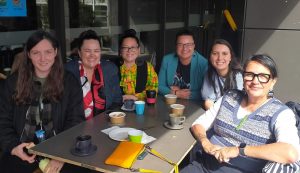
With fellow Māori scholars (L-R): Sam Iti Prendergast, Alice Te Punga Somerville, Marama Salsano, Innez Haua, Karamea, Jo Maarama Kāmira
The following is a reflective piece from Karamea Moana Wright, one of Te Tumu’s PhD candidates in Pacific Islands Studies.
The first Australia Association for Pacific Studies’ conference I participated in was held primarily online in 2021, with separate hubs in Aotearoa and Australia. Because we were in groups on our own campuses, I don’t think I fully understood the magnitude or value of the conference and the association itself until this month, when I attended for the first time in person.
The four days in Canberra at the Australian National University were packed with phenomenal panels, plenaries, roundtables, and whakawhanaungatanga with incredible Pacific thinkers, researchers, artists, leaders, and poets influential in our region and discipline.
This conference opened my eyes in greater measure to salient contemporary conversations taking place in the field, how my own research sits within the broader landscape of Māori, Pacific, and Indigenous Studies, and to see what is possible in my work moving forward. The AAPS conference has left me hopeful, motivated, refreshed, rejuvenated, and encouraged, underscoring the necessity to return for the next AAPS conference in 2023, held in Sydney.
Te Tumu’s UORG success
Three Te Tumu staff, Pai Taani, Dr Telesia Kalavite and Associate Professor Karyn Paringatai, have been awarded University of Otago Research Grants (UORGs) that will allow them to undertake or further research projects.
The title of Paia Taani’s research project is “I ahatia taku reo Māori? Tracking intergenerational transmission of te reo Māori within whānau”. She says, “my own experiences of learning te reo Māori as a second language and raising my own children with the language sparked my interest to investigate what happened to my language. This research project will therefore investigate the intergenerational transmission of te reo Māori within my whānau.”
Paia’s aim is to is to contribute to the existing research and literature about the use of te reo Māori within the context of whānau. Her research includes analysing whānau narratives to examine the historical intergenerational transmission of te reo Māori and will highlight critical moments within these narratives to explore the factors which affected language transmission within her whānau. The key themes emerging from these accounts will inform future language pathways for her whānau, and may also be used to generate recommendations to offer other whānau who may be seeking to reclaim their language.
The University of Otago Research Grant will help fund travel to the North Island to undertake hui and kōrero with participants, and will also fund a research assistant to undertake transcription work.
Paia expects that she will publish at least two journal articles from her research project, and she will one conference presentation. Another expected output of this research project is a hui with her participants where she will disseminate her findings and discuss ways to move forward with future research and support for whānau wanting to reclaim their language.
Telesia Kalavite’s research project explores “The implications of changing cultural practices in Tongan wedding celebrations in New Zealand”, and how these changes impact on Tongan people’s lives in New Zealand. This project has national and international significance in understanding the development of Tongan culture and identity in the diaspora as well as the myriad cultural, social, economic, political and environmental impacts that are encompassed in Tongan wedding celebrations. It will identify and map out traditional cultural practices in Tongan weddings over time and space. This will provide a context in which to explore contemporary factors affecting Tongan wedding practices in Aotearoa.
Telesia sees this as a pilot study for a larger project in the future on how Tongan celebrations impact on Tongan people’s socio-cultural and economic development in Aotearoa New Zealand. She says “I am a Tongan researcher, and it is very important that to get this kind of research righ; there should be people with clear expertise and connection to it, like myself.”
Karyn Paringatai is collaborating with Marcelle Wharerau, formerly a Te Tumu student and staff member who is now an academic based at the Tauranga campus of Te Pua Wānanga ki te Ao – Faculty of Māori and Indigenous Studies, University of Waikato. Their project is titled “Te Aho Tāngaengae: Māmā, Wahine, Māori, Academic”. Socio-economic stability through intergenerational mobility is a priority of whānau Māori; ensuring that future generations have full access to a range of resources that enhances intergenerational whānau wellbeing. Income, education and occupation feature predominantly in intergenerational mobility studies as primary indicators of social and economic status. However, this focus is too narrow and neglects the importance of also embedding cultural stability and responsibility. Whilst socio-economic stability and upward mobility is a priority of Māori, equally important is the intergenerational transmission of te reo Māori and tikanga Māori.
Colonisation has had profound negative effects on all aspects of te ao Māori, including maintaining intergenerational responsibilities for protecting and enhancing the mana of whānau, hapū and iwi. In this unique research, Karyn and Marcelle aim to show how the reestablishment of this intergenerational responsibility to contribute to the decolonisation of te ao Māori must be a deliberate priority and why it is of urgency to do so.
Te Aho Tāngaengae gives voice to the narratives of wāhine Māori academics who are first in family to complete higher education/university and the mechanisms they employ in the intergenerational transmission of cultural capital. Increasing the capacity, and linguistic and cultural capabilities of Māori across generations who can tangibly contribute to improving the social, economic and political wellbeing of te ao Māori must be a priority. This research is important to reveal new insights into the methods used that have the potential to accelerate transformative change within whānau for generations to come.
New Book on Indigenous Research
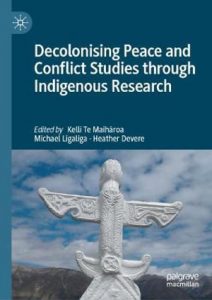 Decolonising Peace and Conflict Studies through Indigenous Research is a new edited collection, published by Palgrave Macmillan, with several Te Tumu connections.
Decolonising Peace and Conflict Studies through Indigenous Research is a new edited collection, published by Palgrave Macmillan, with several Te Tumu connections.
One of the editors, Dr Kelli Te Maihāroa graduated from te Tumu with her PhD on Māori peace traditions in 2020; and Vaivaimalemalo Dr Michael Ligaliga was until recently a member of Te Tumu staff. The third editor, Dr Heather Devere, who recently retired from the National Centre for Peace and Conflict Studies, was also well known to many Te Tumu staff.
The book is made up of three main sections: Indigenous Epistemologies, Methodology and Method; Peace Education and Indigenous Research; and Indigenous Perspectives on Peace Development and Peace Processes, with a global array of contributing authors. For the contents list, and download options, click here.
Congratulations to Kelli, Michael and Heather for this exciting new book.
Dunedin Cook Islands Research
It’s always great when undergraduate students get an opportunity to undertake research. This summer, Dr Emma Powell of Indigenous Studies had two young students helping with her look at the history and experiences of Cook Islanders in Dunedin as part of the ‘Akapapa’anga nо̄ te iti tangata project.
The following is an account from one of the students, Tiare Makanesi.
At the beginning of 2022, Emma Samuels and I had the privilege of working alongside Emma Powell on ‘Akapapa’anga nо̄ te iti tangata: Stories from the Cook Islands Community in Dunedin. With this project, we learnt more about the Cook Islands community in Dunedin and the journeys of our community from the Cook Islands to New Zealand. From finding Cook Islands dance troupes in the early 60s to learning about the Uki Tamariki Ou Cook Islands childcare centre that was set up in the early 2000s in Corstorphine, we gained a better understanding of our culture and how significant it is to the culture of Dunedin.

Anja Matapo, with the research students for the ‘Akapapa‘anga nō te iti tangata project, Emma Samuels and Tiare Makanesi.
We spent most of our time scouring through an array of archives to create a foundation of knowledge to prepare us for our on-going community work. The Hocken was our most used archive where, with past papers and microfilm, we discovered many stories that captured beautiful Cook Islands values and parts of our culture.
One article that I believe expresses the importance of our ui tupuna (ancestors) was an ODT piece from 1993. Emma’s pāpā (grandfather) was interviewed during a study about why the majority of rest home residents are European. Pāpā Puka attributed living with his children as a common tradition practised throughout Polynesia. This custom shows how we treasure and continue learning from their puna (springs) of knowledge. We look after them as they did us. This article reminded us of how important it is to respect and care for those that raised us.
Another article that we came across was about a community leader, Pāpā Kōpu Rouvi, and his involvement within the Dunedin Cook Islands community since 1966! Papa Kopu served the community when bringing Cook Islanders from the Islands to Dunedin, supporting those that needed advice. He became a role model that recently arrived Cook Islanders could confide in. This year was the second year anniversary of his passing and Emma and I organised a gift for his family on behalf of the Otago University Cook Islands Students’ Association. The support and guidance he gave University students over the years was irreplaceable and we wanted to show our appreciation.
Emma’s part in this project has included project managing the Cook Islands’ community’s (Te Vaka Cook Islands of Dunedin Inc.) oral history project, funded by the Ministry of Culture and Heritage. Her time has been spent upskilling and organising so that the community can complete this project to deadlines and to the standards expected by the funder. Thoughtful communication, the importance of a plan B and taking that extra step for refinement are all things Emma has learnt and put into practice. Emma said this project was more than just researching for her. It was a special insight into a community that she loved being a part of. She has focused on organising an oral history workshop for the community with oral historian, Helen Frizzell, and others at the National Library, and she created an adjusted budget and plan for the project following the award in late 2021.
For Emma and I, it has been an extremely rewarding experience to delve deep into the histories of our Cook Islands community here in Dunedin. Although we are Dunedin-born and raised, we hadn’t grown up involved in Cook Islands events. This project has helped us reconnect with our culture in so many ways. We now have a wealth of knowledge and a kete (basket) of ideas to continue enriching the community through the Otago Cook Islands Students’ Association. The difficulty of uncovering this knowledge also inspired us to amend our association’s constitution to donate to the ephemera collection at the Hocken Archives every year. This will be a growing legacy of our footprints as Cook Islands students here at Otago University.
Emma and I are thankful for this opportunity to dig through the archives as we never would have without encouragement. We were rewarded with evidence of sports teams, church functions and cultural programmes throughout the archive. Not only was I fortunate enough to learn about my cultural heritage but also my family’s history. I am now more aware of my language, culture and how my grandparents experienced life when they arrived here. That was my favourite part of this project. It has allowed us to build strong connections within the community which is important when finding our identity. It really has helped us discover what it truly means to be a Cook Islander here in Dunedin.
We have the deepest gratitude for Te Vaka and Emma Powell for putting their faith in us to execute this research. We have gained many skills and experiences during our work and appreciate the responsibility given to us. We would like to thank Te Tumu and the University of Otago for allowing us to take a break from our supermarket jobs and fully immerse ourselves in such a rewarding “job”.
Meitaki ma’ata,
Tiare Makanesi.
Looking for a new Dean
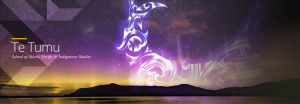 The university is advertising for a new Dean of Te Tumu, someone who is a great leader, researcher and person, with research and teaching aligning to Māori, Pacific, or Indigenous Studies (or a combination of these). CLICK HERE FOR LISTING.
The university is advertising for a new Dean of Te Tumu, someone who is a great leader, researcher and person, with research and teaching aligning to Māori, Pacific, or Indigenous Studies (or a combination of these). CLICK HERE FOR LISTING.
Please share this to your networks, and to anyone who you feel might be the right person for the job. Te Tumu is an exciting, dynamic school, at the best university in New Zealand.
MIndS students’ success
It’s graduation this coming Saturday (21 Aug), and Te Tumu is lucky to have three Master of Indigenous Studies students who are graduating. This is always a wonderful occasion for graduates themselves, as well as their families and their supervisors.
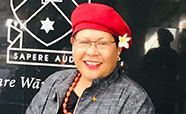 Tofilau Nina Kirifi-Alai (Sāmoa) was until recently the Manager of the University of Otago’s Pacific Islands Centre. She is currently the Inaugural Manager of Pacific Community Engagement, University of Otago, based in Auckland. This is a new role that the University of Otago established this year.
Tofilau Nina Kirifi-Alai (Sāmoa) was until recently the Manager of the University of Otago’s Pacific Islands Centre. She is currently the Inaugural Manager of Pacific Community Engagement, University of Otago, based in Auckland. This is a new role that the University of Otago established this year.
Research Title: “The Development of the Pacific Islands Centre at the University of Otago, Dunedin, New Zealand: A Personal Reflection”.
Supervisor: Telesia Kalavite
Abstract: “The purpose of a Centre for Pacific students is to seek and find ways whereby meanings, nuances and metaphors in Pacific cultures can speak to the heart, the soul and the mind of the students. The challenge here, as in other places, lies in how to articulate speech and writing to get meanings, nuances and metaphors of Pacific cultures within a monocultural academic environment” (Comment by His Highness Tui Atua Tupua Tamasese Ta‘isi Efi‘s inauguration speech at the formal opening of the Pacific Islands Centre, University of Otago, in 2003).
The establishment of the Pacific Islands Centre (PIC) in 2001 was a response by the University of Otago (UO) to the Tertiary Education Commission (TEC) initiatives to ensure the success of its Pacific students. Pacific Islands people’s participation in New Zealand society, including education, is still lagging behind that of the general population since the late 1960s. The PIC was the first-ever centre within New Zealand Tertiary Education Organisations (TEOs) and this year, 2021, marks its 20th anniversary. The PIC creates pathways for students’ success at the UO reflecting the government’s continuous attempt to improve the success rate of Pacific peoples in the education system. The PIC strongly becomes the impetus to lead and implement support for Pacific students and staff through its engagement with the UO and Pacific communities locally, nationally, regionally and internationally.
This research takes an autoethnographic Pacific approach. Autoethnographic because it documents my reflections as the inaugural Manager of the PIC since 2002; Pacific because it is a Pacific-focused centre, operated by Pacific staff for Pacific students and, most importantly, I, the researcher am Samoan, and of Pacific decent. My voice becomes central in documenting the Centre’s developmental history because when I first started as the pioneer of the PIC there was no specific Pacific model to build on, or strategic framework or manual to guide it. This research therefore, is basically grounded on Pacific philosophies of attitudes, views, ideas, values, beliefs, customs, traditions, practices and experiences of the researcher.
The PIC is significant for the educational development of Pacific students and staff at the UO. This research documents the journey of the PIC in terms of its history, developmental strategic plans, practices and reviews that enhance the success of everyone involved. This research is unique and authentic in its approach as it provides first-hand information on how the PIC nurtures Pacific Islands students in their academic journeys. It also adds value to the development of educational strategic directions of the UO to benefit both Pacific and non-Pacific communities at Otago, New Zealand, the Pacific region, and the world.
The first generation consists of the maternal and paternal grandparents of the author, in which they discuss vasu in its political definition of ‘half-caste’ or of mixed ethnic heritage. This generation will also elaborate on contributing themes to vasu, such as their relationships with their kinship groups, languages/dialects and their Fijian identity. As this generation is the only group to have regular visits and contact with their rural villages, vasu will be viewed through this lens.
The next generation is of the author’s parents and they will also discuss themes such as their own Fijian identity, as well as the role of Fijian women, domestic workers and accessibility to the village. This particular generation is part of the urban migration and will reflect over vasu with this viewpoint.
Finally, the last generation is of the author’s and her maternal and paternal first-cousins. The supporting themes for this generation’s understanding of vasu are customary Fijian relationships and concepts, mixed ethnicity and the use of Fijian language and knowledge. This generation is a part of the Fijian diaspora in New Zealand and will be using this perspective in sharing their understandings and experiences of vasu. Eventually, similar elements and concepts will be highlighted, with each generation sharing their own narratives on what vasu is to them. Despite the different time periods and physical contexts, the prominence of the maternal lineage has proven to play a significant role in every generation of this family, particularly in a patriarchal society that is known to Fiji.
 Nicola (Nicky) Andrews (Ngāti Pāoa) Nicky is currently a faculty librarian at the University of San Francisco where she teaches undergraduates how to do research; and work on other projects including research into Indigenous information literacy. She is open to pursuing a PhD in the future.
Nicola (Nicky) Andrews (Ngāti Pāoa) Nicky is currently a faculty librarian at the University of San Francisco where she teaches undergraduates how to do research; and work on other projects including research into Indigenous information literacy. She is open to pursuing a PhD in the future.
Nicky was initially supervised by the late Alumita Durutalo. Paerau Warbrick took over during the research design and interview phase, and Erica Newman supervised her work during the bulk of the writing and revising phase. Nicky is thankful to all three for their work and care. She will graduate in absentia.
Research title: “Historical Trauma, Indigenous People, and Libraries.”
Abstract: Historical trauma theory (HTT) built on understanding of Holocaust survivors and subsequent generations (Pihama et. al., 2014) and articulated how colonization and genocide against Indigenous peoples also resulted in historical trauma and intergenerational grief (Brave Heart & DeBruyn, 1998; Methot, 2019). In this research report, I examine how modern libraries reinforce historical trauma for Indigenous library users and workers through library origins, professional credentialing, staffing demographics, and policies. While historical trauma theory is rooted in social work (Brave Heart & DeBruyn, 1998), it is applicable to librarianship as a profession of public service that impacts Indigenous access to knowledge and self-discovery.
I conducted my research using kaupapa Māori and autoethnography frameworks, to interview five Indigenous librarians from Aotearoa, Canada, and the United States. Over Zoom, participants detailed their unique experiences as Indigenous people using libraries, studying library science, and working in libraries.
Participants spoke candidly about the racism and microaggressions they routinely encounter; and the isolating nature of often being the only Indigenous worker in their team or place of employment. In particular, participants recounted how historical trauma resurfaced when facing inadequate resources to support Indigenous knowledge, or when organizations reinforced policies that conflicted with Indigenous practices and worldviews.
However, participants also described hope and progress towards equity, aligning with contemporary shifts toward valuing Indigenous peoples in libraries. I make and acknowledge several recommendations in this report ranging from practical changes to library policies and practices, to frameworks to address historical trauma within library spaces. These practices can be applied beyond libraries into higher education, government work, and other sectors.
This Reseach can be accessed through OUR Archive.
Te Tumu would also like to congratulate Pipi Royal who will be graduating with their BA in Māori Studies.

